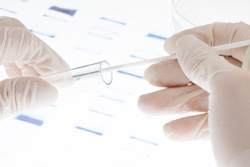Cellular repair goes beyond genetic functioning
The regulatory roles of epigenetic mechanisms hold promise as targets for the treatment of neurodegeneration and various cancer-related pathologies. Recent studies have discovered deficiencies in DNA-repair mechanisms at the core of these diseases. To investigate the significance of these findings, Xeroderma pigmentosum and Cockayne syndrome present appropriate models for learning more about the link between chromatin remodelling processes and DNA repair. These human syndromes affect nucleotide excision repair, characterised by sensitivity to ultraviolet (UV) irradiation, which is one of the major DNA repair systems in human cells. The Epiner2007 project aimed to study the influence of chromatin remodelling in the processing of lesions induced by shortwave ultraviolet light (UVC) using a Chinese hamster cellular model. In the first phase of the project, the distribution of UVC-induced lesions at the chromosome level in mutant and normal cells was analysed. Results were contrary to expectations, with less chromosome lesions being observed in DNA-repair–deficient cells than in normal ones. The second phase of the project investigated how changes in the histone acetylation pattern influence the processing of DNA lesions induced by UVC. Results revealed that when exposed to trichostatin A (TSA) before UVC-irradiation, normal cells can behave just like Cockayne syndrome simile cells. TSA has a wide range of epigenetic activities and can be used to alter gene expression. Results of experiments involving cells exposed to TSA before UVC irradiation indicate that an imbalance in histone acetylation levels might change recognition sites for DNA repair. This disrupts proper interaction taking place between repair proteins and DNA lesions deep within the modified chromatin structure. Data produced by the Epiner2007 project suggest that certain neurodegenerative syndromes could have a molecular base related to epigenetic changes, as seems to be the case with Cockayne syndrome. Knowing how epigenetic changes affect the removal of induced DNA lesions could help sensitise tumour cells to classical chemotherapy and radiotherapy treatments.

